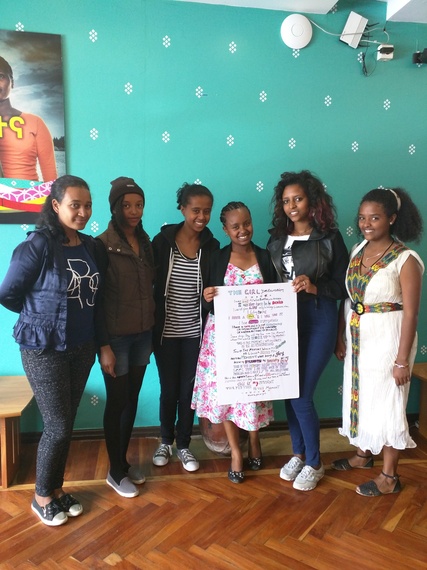At the 2015 Finance for Development, leaders and finance ministers from the world's governments gathered in Addis Ababa, Ethiopia for a conference that enormously impacts the lives and livelihoods of millions of the world's poor, most of whom are women and girls. Denise Dunning, PhD (Founder & Executive Director of Let Girls Lead), Melanie Poole (Senior UN Advocacy Advisor at CARE International), and Neil Datta (EPF Secretary), Rita Muyambo (Head of Programmes, World YWCA), remind them that their work is far from over.
Last week, leaders and finance ministers from the world's governments gathered in Addis Ababa, Ethiopia, for "Financing for Development," a conference that enormously impacts the lives and livelihoods of millions of the world's poor, most of whom are women and girls. Among the most marginalized and excluded, and upon whose inclusion progress depends, are adolescent girls. Their chances of living healthy, fulfilling lives depends on a strong and certain outcome. This is the message girl leaders delivered Addis, including as part of the World Bank's Global Financing Facility launch.
This year, as the Sustainable Development Goals (17 new development goals that will replace the Millennium Development goals) have been debated, the world's governments made powerful statements at the UN. They promised to empower women and girls, and they acknowledged that we cannot fight poverty or address climate change if women and girls are left behind. Last week's conference in Addis Ababa challenged them to deliver on those promises.
Our organizations, working in more than 150 countries with the world's under-served and under-represented women and girls, urge government leaders to meet this challenge. We remind them that systemic political problems, which disproportionately burden women and girls, must be fixed. We state unequivocally that to ensure meaningful progress, the rights of women and girls, especially adolescent girls, must be prioritized.
Women's civil society organizations have played an important role, through many decades, in getting us to a point where strong language on gender is integral to the Post 2015 development agenda. We are proud and pleased. But the real test - the thing that will tell us whether we are really standing on the verge of a transformative path to progress - is whether leaders who met in Addis Ababa will follow up on their promises with political and financial commitments.
We are worried.
We are worried about the future flows of Overseas Development Aid. Many countries are decreasing their aid contributions, even as they promise to support the Sustainable Development Goals. The world is relying on the leaders of developed countries to make genuine their promises. They will show this by committing to delivering 0.7% of their national income as aid by 2020.
We are worried about the hemorrhaging of national resources, particularly those in developing countries, via illicit financial flows. Trillions of dollars are being illegally transferred from one country to another, via corruption in their form of bribes, tax evasion, criminal activities, and cross-border smuggling. The world urgently needs reforms that will allow governments to share and publish critical financial and non-financial data to stem these enormous losses.
We are worried about tax evasion - about the billions of dollars lost when tax systems are broken, and about the resulting way in which women and girls are deprived of a chance to share in the fruits of economic growth. We want to see discussions about tax evasion brought out into the open - unlike the current system, in which developing countries are excluded from the conversation.
We are glad that the outcome document for the Financing for Development conference champions gender equality and human rights. But there is a disproportionate focus on women's economic participation as being primarily a means to financial growth. We join with many other civil society organizations to urge that women's participation in the economy be included first as a matter of human rights. When we invest in girls, they can better determine their own futures. They can decide if, when, and whom to marry. They can go to school, safely and without interruption. In doing so, they can realize their full economic, social and political potential. By making investments in girls, we can uplift entire economies. Girls need not be treated as tools for generating profit and growth. By supporting their human rights, we will unleash the world's greatest untapped resource.
Finally, we are worried that no binding frameworks have been put forward with which to hold the private sector accountable to the goals concerning gender equality, and women's financial inclusion and empowerment - nor to ensure that business practices are environmentally sustainable and respect human rights. We welcome the support of the private sector in financing and implementing the new development agenda, and there must be ways for communities - particularly women and girls who are among the most voiceless and marginalized - to hold all stakeholders accountable.
The return on investing in women and girls, especially adolescent girls, is demonstrably high. So are the costs of excluding them. The success of the Sustainable Development Goals depends on a strong Ffd follow through: where developed countries meet their aid obligations, where governments work together to stop illicit financial flows and fix broken tax systems, and where resources are made available to invest in the human rights of women and girls.
Moving forward, each one of us needs to call on the world's leaders to deliver on these promises.
The Girl Declaration is a call to action to put girls at the heart of the post-2015 development agenda.
By Denise Dunning, PhD, Founder & Executive Director of Let Girls Lead; Melanie Poole, Senior UN Advocacy Advisor at CARE International; Neil Datta, EPF Secretary; Rita Muyambo, Head of Programmes, World YWCA
Let Girls Lead empowers girls and their allies to lead social change through advocacy, education, economic empowerment, storytelling and strategic partnerships, contributing to improved health, education and livelihoods for more than 7 million girls globally.

